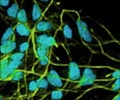New 'chronotherapy' aligns arthritis drugs with your body clock for better results.

Body's Clock Meets Gene Therapy: Timed Arthritis Drug Release
Circadian rhythm refers to the body's 24-hour clock which is regulated by the brain and responds to light. Using a combination of synthetic biology and tissue engineering, Dr. Guilak’s research team developed circadian-based gene circuits, termed “chronogenetics,” that can be programmed into stem cells that, once implanted in the body, align with a patient’s natural circadian rhythm and deliver anti-inflammatory drugs on a daily basis at a prescribed time. Certain arthritis drugs need to be injected daily to be effective, which is particularly difficult for children to endure.‘Scientists are developing #stemcells that can deliver #antiinflammatory drugs based on YOUR body's natural clock! This #chronogenetics approach could revolutionize medicine. #arthritis’





“This is the first time that the cell’s internal clock has been used for controlling drug delivery," said Dr. Lara Pferdehirt, first author of the study. While the laboratory has previously developed self-regulating “smart” cells that produce drugs in response to inflammation, this new approach was used to create stem cells that automatically make drugs based on the body’s daily rhythm.
“Every cell in our body is on a 24-hour cycle, including cells that can carry flares of inflammation that often accompany conditions like rheumatoid and juvenile arthritis,” said Guilak. “Patients who have arthritis pain often experience their peak symptoms and inflammation in the early mornings, around 3 a.m. to 5 a.m., a time when people do not normally take medication. To address this, we’ve created a new field called chronogenetics, bioengineered stem cells that automatically release the drugs timed to your own body to treat disease flares even before they happen.”
Dr. Guilak said his team’s research has shown that timing the application of medicine to line up with the body’s circadian rhythm can not only help relieve pain but, in some cases, change the course of the disease. He said the findings could eventually be utilized to treat other health conditions, such as cancer or diabetes, which also show circadian characteristics.
“For diseases like rheumatoid arthritis, the sooner you diagnose and treat the condition, the more you can prevent inflammation that damages the joints,” said Dr. Guilak. “If the body can receive medication ahead of those flare-ups that therefore prevents joint damage, then the disease won’t progress. Juvenile arthritis and RA can be very painful and symptoms can feel very debilitating, especially for children so we’re hopeful that this new research can help reduce symptoms. This technology has the potential to change a lot of lives. There are no drugs that currently reverse the course of a disease, but we’re hopeful this could do that.”
Advertisement
Reference:
- A synthetic chronogenetic gene circuit for programmed circadian drug delivery - (https://www.nature.com/articles/s41467-025-56584-5)
Source-Eurekalert















